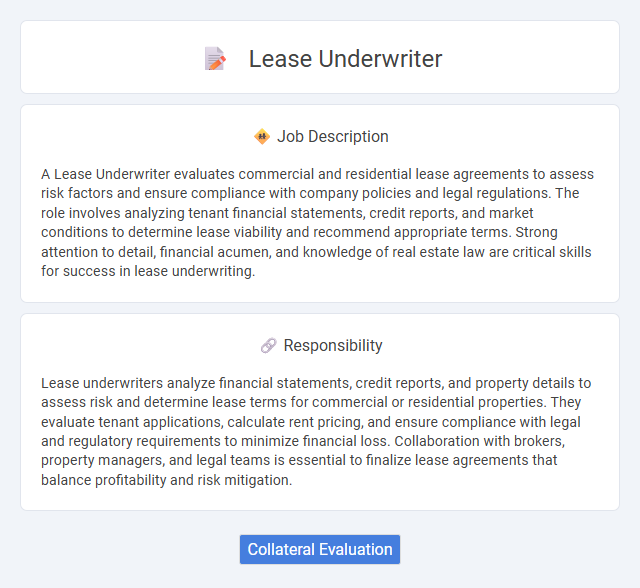
A Lease Underwriter evaluates commercial and residential lease agreements to assess risk factors and ensure compliance with company policies and legal regulations. The role involves analyzing tenant financial statements, credit reports, and market conditions to determine lease viability and recommend appropriate terms. Strong attention to detail, financial acumen, and knowledge of real estate law are critical skills for success in lease underwriting.
Candidates with strong analytical skills and attention to detail are likely suitable for a Lease Underwriter role, as the job requires evaluating rental applications and assessing tenant risk. Individuals comfortable with interpreting financial data and making informed decisions under uncertainty probably perform well in this position. Those lacking patience for thorough document review or weak judgment skills may find the role challenging.
Qualification
A Lease Underwriter typically requires a bachelor's degree in finance, real estate, or a related field, combined with strong analytical skills and experience in risk assessment. Proficiency in financial statement analysis, lease structuring, and knowledge of market trends are essential qualifications. Certifications such as Certified Commercial Investment Member (CCIM) or similar real estate credentials enhance a candidate's expertise and marketability.
Responsibility
Lease underwriters analyze financial statements, credit reports, and property details to assess risk and determine lease terms for commercial or residential properties. They evaluate tenant applications, calculate rent pricing, and ensure compliance with legal and regulatory requirements to minimize financial loss. Collaboration with brokers, property managers, and legal teams is essential to finalize lease agreements that balance profitability and risk mitigation.
Benefit
Lease Underwriters likely benefit from gaining specialized expertise in evaluating leasing agreements, which can enhance their decision-making accuracy and reduce financial risks for their organizations. They probably enjoy improved job stability and career growth opportunities due to their critical role in property and asset management industries. Access to competitive salaries and performance-based incentives may also be common advantages associated with this profession.
Challenge
Lease Underwriters likely encounter challenges in accurately assessing the risk and financial viability of lease agreements amid fluctuating market conditions. They may need to navigate complex financial data and legal terms to ensure compliance and profitability. The role probably demands strong analytical skills and attention to detail to mitigate potential losses and support sound decision-making.
Career Advancement
Lease Underwriter professionals develop expertise in financial analysis, risk assessment, and contract evaluation, positioning themselves for career growth in real estate finance and asset management sectors. Mastery of lease underwriting software and regulatory compliance enhances their qualifications for senior roles such as Underwriting Manager or Portfolio Risk Analyst. Continuous skill development in market trend analysis and negotiation strategies supports advancement into leadership and strategic planning positions within property management firms and financial institutions.
Key Terms
Collateral Evaluation
A Lease Underwriter specializing in Collateral Evaluation meticulously assesses the value and condition of assets offered as lease security, ensuring they meet lending criteria and minimize financial risk. This role involves analyzing market trends, residual values, and asset depreciation to accurately estimate collateral worth. Expertise in asset appraisal methods and familiarity with industry-specific leasing standards are critical for safeguarding company investments and supporting informed credit decisions.
 kuljobs.com
kuljobs.com